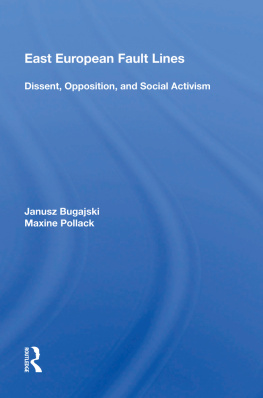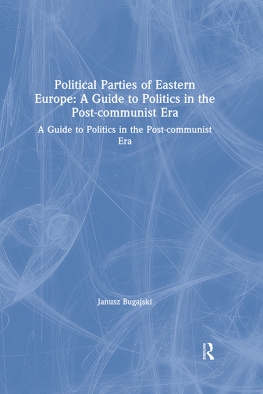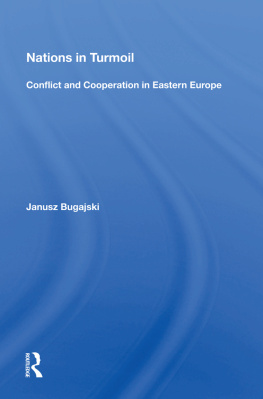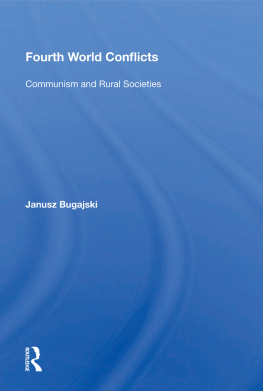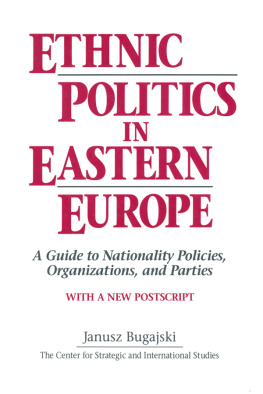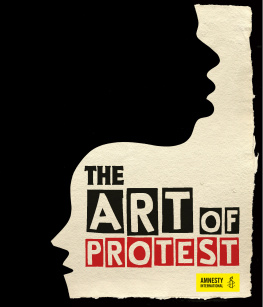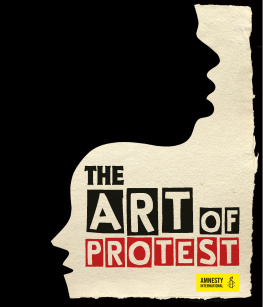East European Fault Lines
East European Fault Lines
Dissent, Opposition, and Social Activism
Janusz Bugajski and Maxine Pollack
First published 1989 by Westview Press
Published 2018 by Routledge
52 Vanderbilt Avenue, New York, NY 10017
2 Park Square, Milton Park, Abingdon, Oxon OX14 4RN
Routledge is an imprint of the Taylor & Francis Group, an informa business
Copyright 1989 by Taylor & Francis
All rights reserved. No part of this book may be reprinted or reproduced or utilised in any form or by any electronic, mechanical, or other means, now known or hereafter invented, including photocopying and recording, or in any information storage or retrieval system, without permission in writing from the publishers.
Notice:
Product or corporate names may be trademarks or registered trademarks, and are used only for identification and explanation without intent to infringe.
Library of Congress Cataloging-in-Publication Data
Bugajski, Janusz, 1954
East European fault lines: dissent, opposition, and social
activism / Janusz Bugajski and Maxine Pollack.
p. cm.(Westview special studies on the Soviet Union and
Eastern Europe)
Bibliography: p.
Includes index.
ISBN 0-8133-7714-5
1. Europe, EasternPolitics and government1945- . 2. Dissenters
Europe, Eastern. 3. Social actionEurope, Eastern. I. Pollack,
Maxine. II. Title. III. Series.
DJK50.B84 1989
947dc19 89-5647
CIP
ISBN 13: 978-0-367-01274-8 (hbk)
To Winifred, Arthur, Jadwiga, and Piotr
During the course of our research for this book, the following libraries, institutions, and organizations proved particularly valuable; Radio Free Europe/Radio Liberty (Munich, West Germany); Library of Congress (Washington, DC); Hoover Institution (Stanford University, California); London School of Slavonic and East European Studies; Solidarity Information Office (London); Hungarian October Freepress Information Centre (London); Palach Press Ltd (London); and the Helsinki Watch Committee (New York).
Rewarding research assistance during various parts of the project was provided by: Monika Michejda, Alina Zyszkowski, Catherine Murray, Pamela Rein, Heidi Liszka, Ilinca Popescu, Jeanette Besemer, Lisa Gibney, Adriana Ercolano, Andrea Doromby, Ellen Stroud, Jasmin Kosovic, Michael Uster, Peter O'Brien, John Gutbezahl, David Perry, Robert Scott, Torben Christiansen, Frank Watanabe, and Jean Carlo Rivera.
We would also like to thank the Earhart Foundation for their generous financial support enabling us to complete the project.
Janusz Bugajski
Maxine Pollack
An extensive submerged network of social and political fault lines snakes across the Communist states of Eastern Europe, deepening where dissent and opposition are most trenchant. These areas of independent activity, which by definition challenge the Communist Party stranglehold on freedom of expression and public self-organization, indicate a corresponding systemic vulnerability. Though it would be premature to predict an imminent "earthquake" of revolutionary proportions resulting from these fault lines, the latter do constitute definite long-term weaknesses in the Leninist political bedrock. A comprehensive "seismological" study of this phenomenon is overdue. This work endeavors to provide a comparative analysis of oppositionist trends in the Soviet satellite states of contemporary Eastern Europe: Bulgaria, Czechoslovakia, the German Democratic Republic, Hungary, Poland, and Romania. It gauges, describes, and evaluates the extent and objectives of independent social activism in these countries, and explores both the causes and effects of public dissent. Limited space precludes a full assessment or even a complete listing of every dissident group, oppositionist trend, and independent public initiative in the East bloc. We principally single out movements and campaigns which serve as pertinent examples of distinct independent currents and strategies in the region. The study also provides an overview of the major literature on Soviet bloc dissent, and draws attention to less well known sources of unofficial ideas and actions.
quished it; the flowering of the Solidarity movement in 1980-81 and the imposition of martial law that outlawed it.
is a thematic continuation of the preceding chapter that focuses on various forms of extra-systemic social activism. Whereas revisionism and reformism attempt to change the system from within, social activism during the past decade in particular, emphasizes transforming the existing social, political, and economic order from outside the Communist power structure. One major dichotomy proposed here is that between revolutionism and evolutionism; the latter can in turn be subdivided into a predominantly social and an explicitly political strategy of change. In addition, manifestations of individual non-conformism, unorganized dissent, and non-violent protest are explored. Social movements of self-defense and public resistance are documented, as are more substantial independent mass movements and embryonic "alternative societies." A concluding section on dissident foreign policy highlights international cooperation between oppositionists within the Soviet bloc, as well as their points of contact with the West.
A country-by-country analysis of political movements and human rights campaigns is presented in . The first section deals with Solidarity's Poland, focusing on underground and above-ground structures of the free trade union movement and on the avowedly political groupings it has helped to spawn. A second part looks at the Charter 77 human rights campaign in Czechoslovakia, sketching distinctions between the diverse political currents subsumed under the Charter umbrella. From there, the discussion turns to contemporary Hungary and the dissident, largely intellectual activism therein which styles itself as the "democratic opposition." Also covered are the more traditionalist, rural-based Magyar "populists" opposition. Nascent human rights movements and political resistance in the GDR, Romania, and Bulgaria are enumerated in the last section.
An analytic overview of independent and institutional religious activities throughout the bloc is provided in Hungary, Czechoslovakia, Romania, and Poland; and on independent currents in the Orthodox Churches of Romania and Bulgaria. Finally, an assortment of minority religions throughout Eastern Europe are considered, such as the Uniate Catholics, small Protestant sects, Islam, and Judaism.
In , economic initiatives outside or on the periphery of the Party-state system are explored. The first section examines the parameters of government-sponsored economic reforms, and assesses the extent of privatization and free enterprise in agriculture and industry. The latter includes numerous small-scale manufacturers, "cottage industries," and a legion of self-employed petty entrepreneurs. A second section concentrates on parallel economies and informal distribution networks that supply a considerable volume of services and goods on the "black" and "grey" markets. Also considered are the extensive, self-serving bribery networks on the one hand, and charitable aid initiatives on the other. The nature, extent, and impact of free labor unionism and autonomous industrial self-management are also scrutinized in a concluding section.
In independent social campaigns and cultural trends are covered in some detail. Peace and disarmament movements are documented, with particular attention given to the protests of conscientious objectors, nuclear disarmers, and anti-Warsaw Pact groups. Ecological campaigns against the unchecked degradation of the natural environment are then chronicled. The few organized human rights initiatives of several national and ethnic minorities are also explored. In addition, the growing number of autonomous youth currents and student movements is highlighted. On the cultural scene, alternative education programs and independent publishing in the region are examined, as are the political acts of graphic and dramatic artists who work outside official circles.


